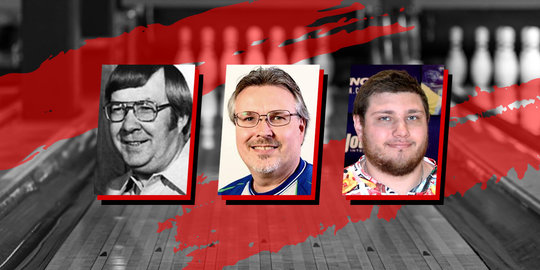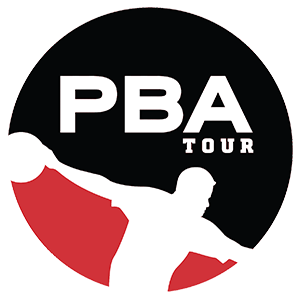
The McCune Family: Three Generations of PBA Champions
Bowling history is littered with successful families. The gold standard, of course, is Dick and Pete Weber, who rank seventh and fourth all-time in PBA titles. Kyle Troup just surpassed his father, Guppy, with his ninth PBA title.
There are plenty more on the horizon, with Parker Bohn III and his trifecta of talented kids, Justin, Brandon and Sydney; Wes and Jordan Malott; Ronnie and Cayden Russell; and Chris, Lynda and Ryan Barnes among others.
But there’s only one family with three generations of PBA champions. You can’t tell the story of the PBA without the McCunes. “We’ve been around forever,” Eugene McCune said.
Don McCune began bowling while in the army. He quickly transformed the hobby into a prosperous career, one that would change the sport forever.
The PBA and USBC Hall of Famer’s career took off in 1968, when he won his first Eagle and PBA title. He added a second Eagle in 1969 and a second PBA title in 1970. Don wasn’t satisfied, though.
Hardened lane surfaces in the early 1970s made hooking the ball, an already difficult task, even more challenging. It wasn’t just the lanes. Don told Sports Illustrated’s Dan Levin that “he could not even scratch the ball with a knife.”
Don thought outside the box, soaking one of his balls in a chemical solvent that made the ball’s cover softer. He found one solution that worked, commencing the “Year of the Soaker.” He won six PBA titles in 1973, earning $69,000 (almost $450,000 today) and Player of the Year honors. Soon everyone was soaking.
While a slew of rule changes later that year would render soaking illegal, Don’s ingenuity revolutionized the sport. It commenced the arms race between bowling ball manufacturers, where each new ball must hook more than its predecessor.
Ball hardness has been perhaps bowling’s defining storyline in 2022. The debate dates back to the soaker’s shrewdness almost half a century ago.
Don passed on his resourcefulness to his son, Eugene, the human rocket-launcher. In his junior days, Eugene said he bowled almost exclusively on leftover league patterns. “I had to play with a Blue Dot at 100 miles an hour if I wanted to get the ball down the lane,” he said.
Eugene has more tricks up his sleeve than most, once winning a PBA regional doubles title after taking his grips out of the ball. “My dad would tell me I couldn't do something,” Eugene said. “So I did it.”
He began competing as an adult at 14, joining his dad’s classic league teams. Those patterns forced him deep inside. “I never got to play shot around 10 my whole life,” he said. Without a refined ability to play the track, wins on the pro tour didn’t come as often as he wanted. But when he could play his A-game, those 22-plus mile-an-hour heaters up the gutter, nobody could beat him.
He boasts two PBA scoring records, both on Cheetah. He fired 3,647 during a 14-game block in 2005 and 2,468 in a nine-game block in 2010. During that nine-game block, where he averaged over 274 with two perfect games, his low game of 236 actually came on the TV pair. He struggled again, by his absurd standards, on the Cheetah Championship show, but a strike on his final shot was enough to defeat Norm Duke.
Eugene defended his title on Cheetah in 2011-12, taking down Pete Weber for his third career PBA title. His first title in 2002 came against Walter Ray Williams Jr. Not many, if any, players have title match victories over three of the four winningest players in PBA history.
At 53 years old, Eugene is still going strong, especially on the PBA50 Tour. Last year, he took home the Senior of the Year award in the Midwest and Central region. He wasn’t the only McCune earning honors in 2020, though. His son, Kevin, won the Midwest Rookie of the Year award.
Kevin, 23, has already made a name for himself on the PBA Tour. He finished 50th on the PBA’s point list this season, one spot behind Chris Barnes. In his first U.S. Open, Kevin finished 16th and closed out match play with a 300 game. Then in his Masters debut, he took home a T-25th-place finish.
With Kevin’s victory last fall at the PBA The Plaza Bowl Midwest Open RPI tournament, the McCunes became the first family with three generations of PBA champions. While Kevin’s win was only a regional, Eugene is confident Kevin will win a national event once his confidence develops. Eugene believes he maintains his upper hand up the lane and in front of the ball return, but concedes the middle part of the lane to Kevin. He raves about his son’s ball roll and mental game, which stems from Kevin’s baseball career.
Kevin primarily played catcher, but took his coach-on-the-field mentality across the diamond. When he moved to pitcher, third base or first base, he viewed the game like a catcher. “That’s how it is in bowling, too,” Kevin said. “You're always the catcher because you're making each call. You have to know what you're gonna do before you're gonna do it.”
He played baseball collegiately, first at Purdue Northwest. After tearing his labrum as a freshman, he said he began to focus more on bowling. He transferred to Calumet College Of St. Joseph, where he also bowled.
Kris, Eugene’s sister, made the 1994 LPBT Hammer Eastern Open telecast. His wife, Chris, became the first woman to shoot 300 at the Indiana state tournament, which she accomplished while Eugene was bowling on TV. “Everybody's got 300 in the family,” Eugene said.
When Eugene and Kevin matched up in the Times Masters Bowling Classic title match last spring, it may have been a passing of the torch. Kevin got the win, but Eugene hasn’t forgotten the three 9-pins he left, nor the 4-pins Kevin tripped. “I let him have the big trophy,” Eugene joked. “You know how kids are today.”
From Don’s revolutionary soaking, to Eugene’s legendary fireball, to Kevin’s promising future, the McCunes have etched their name throughout PBA history.


